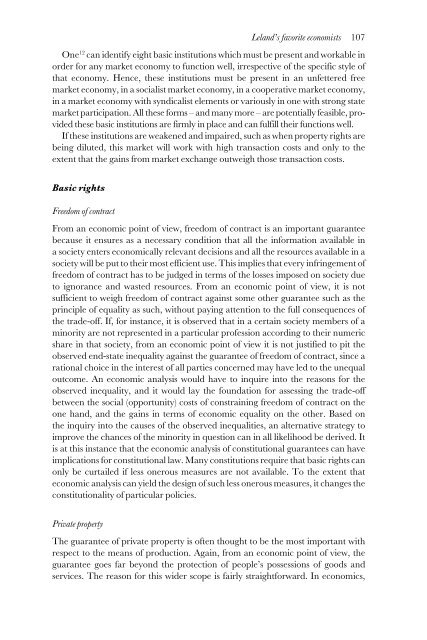Money and Markets: Essays in Honor of Leland B. Yeager
Money and Markets: Essays in Honor of Leland B. Yeager
Money and Markets: Essays in Honor of Leland B. Yeager
Create successful ePaper yourself
Turn your PDF publications into a flip-book with our unique Google optimized e-Paper software.
Lel<strong>and</strong>’s favorite economists 107One 12 can identify eight basic <strong>in</strong>stitutions which must be present <strong>and</strong> workable <strong>in</strong>order for any market economy to function well, irrespective <strong>of</strong> the specific style <strong>of</strong>that economy. Hence, these <strong>in</strong>stitutions must be present <strong>in</strong> an unfettered freemarket economy, <strong>in</strong> a socialist market economy, <strong>in</strong> a cooperative market economy,<strong>in</strong> a market economy with syndicalist elements or variously <strong>in</strong> one with strong statemarket participation. All these forms – <strong>and</strong> many more – are potentially feasible, providedthese basic <strong>in</strong>stitutions are firmly <strong>in</strong> place <strong>and</strong> can fulfill their functions well.If these <strong>in</strong>stitutions are weakened <strong>and</strong> impaired, such as when property rights arebe<strong>in</strong>g diluted, this market will work with high transaction costs <strong>and</strong> only to theextent that the ga<strong>in</strong>s from market exchange outweigh those transaction costs.Basic rightsFreedom <strong>of</strong> contractFrom an economic po<strong>in</strong>t <strong>of</strong> view, freedom <strong>of</strong> contract is an important guaranteebecause it ensures as a necessary condition that all the <strong>in</strong>formation available <strong>in</strong>a society enters economically relevant decisions <strong>and</strong> all the resources available <strong>in</strong> asociety will be put to their most efficient use. This implies that every <strong>in</strong>fr<strong>in</strong>gement <strong>of</strong>freedom <strong>of</strong> contract has to be judged <strong>in</strong> terms <strong>of</strong> the losses imposed on society dueto ignorance <strong>and</strong> wasted resources. From an economic po<strong>in</strong>t <strong>of</strong> view, it is notsufficient to weigh freedom <strong>of</strong> contract aga<strong>in</strong>st some other guarantee such as thepr<strong>in</strong>ciple <strong>of</strong> equality as such, without pay<strong>in</strong>g attention to the full consequences <strong>of</strong>the trade-<strong>of</strong>f. If, for <strong>in</strong>stance, it is observed that <strong>in</strong> a certa<strong>in</strong> society members <strong>of</strong> am<strong>in</strong>ority are not represented <strong>in</strong> a particular pr<strong>of</strong>ession accord<strong>in</strong>g to their numericshare <strong>in</strong> that society, from an economic po<strong>in</strong>t <strong>of</strong> view it is not justified to pit theobserved end-state <strong>in</strong>equality aga<strong>in</strong>st the guarantee <strong>of</strong> freedom <strong>of</strong> contract, s<strong>in</strong>ce arational choice <strong>in</strong> the <strong>in</strong>terest <strong>of</strong> all parties concerned may have led to the unequaloutcome. An economic analysis would have to <strong>in</strong>quire <strong>in</strong>to the reasons for theobserved <strong>in</strong>equality, <strong>and</strong> it would lay the foundation for assess<strong>in</strong>g the trade-<strong>of</strong>fbetween the social (opportunity) costs <strong>of</strong> constra<strong>in</strong><strong>in</strong>g freedom <strong>of</strong> contract on theone h<strong>and</strong>, <strong>and</strong> the ga<strong>in</strong>s <strong>in</strong> terms <strong>of</strong> economic equality on the other. Based onthe <strong>in</strong>quiry <strong>in</strong>to the causes <strong>of</strong> the observed <strong>in</strong>equalities, an alternative strategy toimprove the chances <strong>of</strong> the m<strong>in</strong>ority <strong>in</strong> question can <strong>in</strong> all likelihood be derived. Itis at this <strong>in</strong>stance that the economic analysis <strong>of</strong> constitu tional guarantees can haveimplications for constitutional law. Many constitutions require that basic rights canonly be curtailed if less onerous measures are not available. To the extent thateconomic analysis can yield the design <strong>of</strong> such less onerous measures, it changes theconstitutionality <strong>of</strong> particular policies.Private propertyThe guarantee <strong>of</strong> private property is <strong>of</strong>ten thought to be the most important withrespect to the means <strong>of</strong> production. Aga<strong>in</strong>, from an economic po<strong>in</strong>t <strong>of</strong> view, theguarantee goes far beyond the protection <strong>of</strong> people’s possessions <strong>of</strong> goods <strong>and</strong>services. The reason for this wider scope is fairly straightforward. In economics,
















